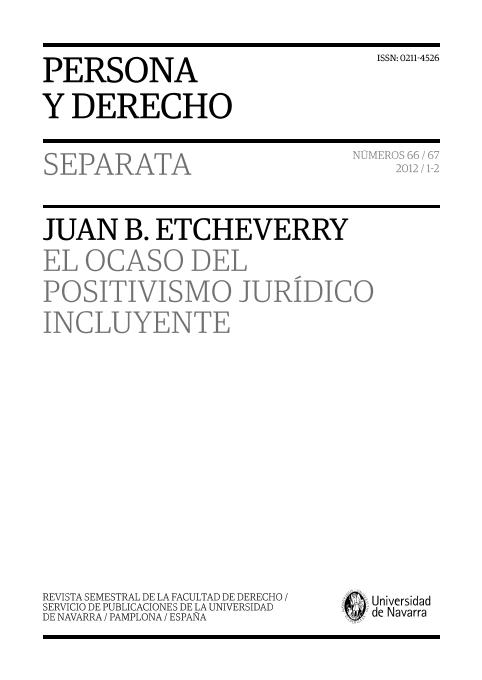Mostrar el registro sencillo del ítem
dc.contributor.author
Etcheverry, Juan Bautista

dc.date.available
2017-08-17T21:37:13Z
dc.date.issued
2013-02
dc.identifier.citation
Etcheverry, Juan Bautista; El ocaso del positivismo jurídico incluyente; Universidad de Navarra. Departamento de Derecho Público e Instituciones Jurídicas Básicas; Persona y Derecho; 67; 2; 2-2013; 407-443
dc.identifier.issn
0211-4526
dc.identifier.uri
http://hdl.handle.net/11336/22658
dc.description.abstract
Este trabajo busca dilucidar si el positivismo incluyente logra renovar la tradición del positivismo jurídico o si, por el contrario, es un reflejo de su decadencia. Para ello, en primer lugar, se presentarán las principales tesis del positivismo incluyente y se advertirá cómo redefine algunas de las tesis tradicionales del positivismo jurídico. Luego se pondrá de manifiesto en qué medida dicha redefinición supone una renovación o un abandono de la tradición positivista. A partir de estos desarrollos se mostrarán las dificultades que tiene el positivismo incluyente para explicar la objetividad de los criterios morales que son incorporados en los sistemas jurídicos actuales. Dichas dificultades de algún modo también afectan su concepción de la discrecionalidad judicial. Además, se sostendrá que esta versión del positivismo jurídico tampoco puede ser presentada (como pretendieron algunos de sus defensores) como una alternativa eficaz frente a la arbitrariedad legal. Por último, se afirmará que el tipo de approach avalorativo del positivismo incluyente lo conduce a resultados poco relevantes.
dc.description.abstract
The purpose of this work is to elucidate if inclusive legal positivism can renovate legal positivism´s tradition or if it is a reflection of its decadence. To that end, the main thesis of inclusive legal positivism will be explained and it will be showed how they redefine some of traditional positivism’s thesis. Next, it will be explained in which way this redefinition of traditional thesis update or leave legal positivism tradition. On this basis, it will be proposed that inclusive positivism has difficulties to explain the objectivity of the moral principles and standards that are incorporated in current legal systems. These difficulties also affect inclusive positivism´s conception of judicial discretion. It will be also held that this version of legal positivism cannot be presented as an effective alternative against legal arbitrariness. Finally, it will be claimed that the non-evaluative approach of inclusive positivism lead to non-interesting or irrelevant outcomes.
dc.format
application/pdf
dc.language.iso
spa
dc.publisher
Universidad de Navarra. Departamento de Derecho Público e Instituciones Jurídicas Básicas
dc.rights
info:eu-repo/semantics/openAccess
dc.rights.uri
https://creativecommons.org/licenses/by-nc-nd/2.5/ar/
dc.subject
Positivismo Jurídico Incluyente
dc.subject
Positivismo Jurídico Excluyente
dc.subject
Tesis de La Diferencia Práctica
dc.subject
Discrecionalidad Judicial
dc.subject
Objetividad Jurídica
dc.subject
Objetividad Moral
dc.title
El ocaso del positivismo jurídico incluyente
dc.title
The decline of Inclusive Legal Positivism
dc.type
info:eu-repo/semantics/article
dc.type
info:ar-repo/semantics/artículo
dc.type
info:eu-repo/semantics/publishedVersion
dc.date.updated
2017-08-17T17:57:24Z
dc.identifier.eissn
2254-6243
dc.journal.volume
67
dc.journal.number
2
dc.journal.pagination
407-443
dc.journal.pais
España

dc.journal.ciudad
Pamplona
dc.description.fil
Fil: Etcheverry, Juan Bautista. Universidad Austral; Argentina. Consejo Nacional de Investigaciones Científicas y Técnicas; Argentina
dc.journal.title
Persona y Derecho
dc.relation.alternativeid
info:eu-repo/semantics/altIdentifier/url/https://www.unav.edu/publicaciones/revistas/index.php/persona-y-derecho/article/view/3131
Archivos asociados
